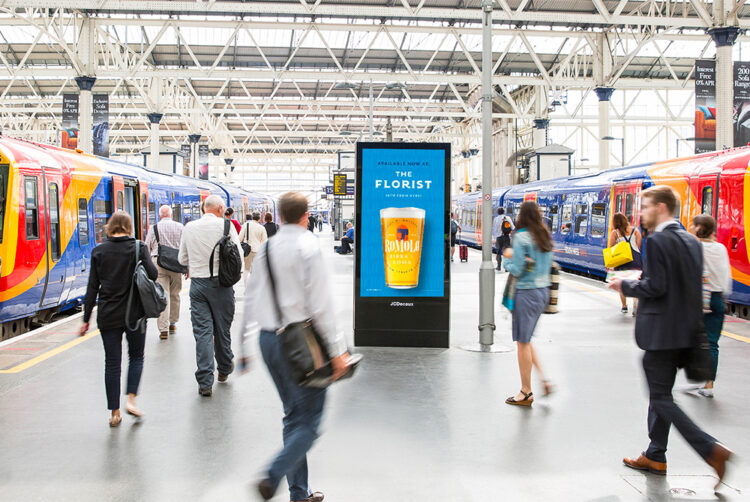Partner content
There are still clear divisions between “your channel” and “my channel” across DOOH and programmatic teams, warns JCDecaux UK’s chief commercial officer.
Professor Leigh Thompson of the Kellogg School of Management defines a team as “a group of people who are interdependent with respect to information, resources, knowledge, and skills who seek to combine their efforts to achieve a common goal”.
Now let’s consider the goal of advertising, in its broadest sense — to convince or persuade consumers to take a specific action. Note the use of the phrase “to take a specific action”. Even though the end goal of advertising is often to drive sales, there are a variety of different paths consumers take before buying and different channels are needed to nudge consumers down each of those paths.
The nuances of each channel mean that distinct skills and knowledge are required to maximise performance. However, every individual working for or on behalf of that brand is still ultimately working towards that end goal — sales — and is, therefore, part of the same team. And by virtue of that fact are interdependent, i.e. they rely on one another.
What happens when two worlds collide?
In the past five years, media owners and technology companies have developed solutions that enable media buyers to purchase digital out-of-home (DOOH) inventory programmatically. This did not happen by chance. This was a strategic move to enable buyers to leverage data to inform buying decisions in DOOH in the same way that they do in online display/video, in-app, social media etc..
The challenge: very few people had significant experience in both worlds. The solution: collaboration. The formation of a new teams with the required inputs to create the desired outcome and a platform from which to share knowledge gained along the way.
Today, there is a lag between the collaborative sell-side and the fragmented buy side and those at the back of the pack are leaving opportunities untapped which poses risks to the achievement of the end goal of sales.
Reasons to embrace change
There’s no denying that prDOOH is here to stay, we have a steady stream of new brands investing each month as well as repeat customers. However, recent conversations with agencies at our roundtable events revealed that there are still clear divisions between “your channel” and “my channel” across DOOH and programmatic teams. A division like this poses many risks, including:
1. Diluting the benefits of both approaches. When two things come together the sum is greater than the parts, by keeping DOOH and prDOOH separate you’re preventing the channel as a whole fromdelivering as best it can.
2. People try to reinvent the wheel. DOOH is not broken, programmatic is not broken — there is no need to reinvent how you talk about either just because they can now be combined. Doing so wastes time and results in confusion and over-complication.
3. Where there is friction people lose their voice in the conversation and ideas go unsaid, opportunities fall by the wayside. No one wants that, it goes against the purpose of the team.
4. When you create a silo where there is no need for one, I.e. separating prDOOH from DOOH and/or other channels, it is seen as a tactic, not a strategic move. This makes it hard to establish a consistent approach, impedes innovation, and means you never realise the true value the thing you’ve placed in the silo.
What goes into the perfect team?
When I first got involved in grass roots football at the age of nine, I was fortunate enough to have coaches that not only taught us the physical skills we needed on the pitch but also what it means to be part of a team: Collective success, collective failure, frustration, happiness, leading and being led, personal motivation and working out what makes people tick, having each other’s back, loving seeing others succeed.
This is something that I’ve never forgotten and regularly talk about with my team regardless of whether we’re celebrating success and being there for each other when things are bad.
The perfect team is one that delivers seamlessly on the desired outcome. In order to do this, you need the right information, resources, knowledge, and skills in the people and processes you have. This means bringing together people who have decades of experience planning and buying OOH/DOOH and who understand audiences with programmatic experts who understand how to use data sources that are not necessarily directly linked to planning and buying OOH/DOOH to inform decisions.
This is sophistication in teamwork. This holistic, systematic approach enables you to simplify things, offset the risks associated with something new, and – perhaps most importantly – avoid missing out due to inaction.
Mark Bucknell is chief commercial officer at JCDecaux UK
Adwanted UK is the trusted delivery partner for three essential services which deliver accountability, standardisation, and audience data for the out-of-home industry.
Playout is Outsmart’s new system to centralise and standardise playout reporting data across all outdoor media owners in the UK.
SPACE is the industry’s comprehensive inventory database delivered through a collaboration between IPAO and Outsmart.
The RouteAPI is a SaaS solution which delivers the ooh industry’s audience data quickly and simply into clients’ systems.
Contact us for more information on SPACE, J-ET, Audiotrack or our data engines.




